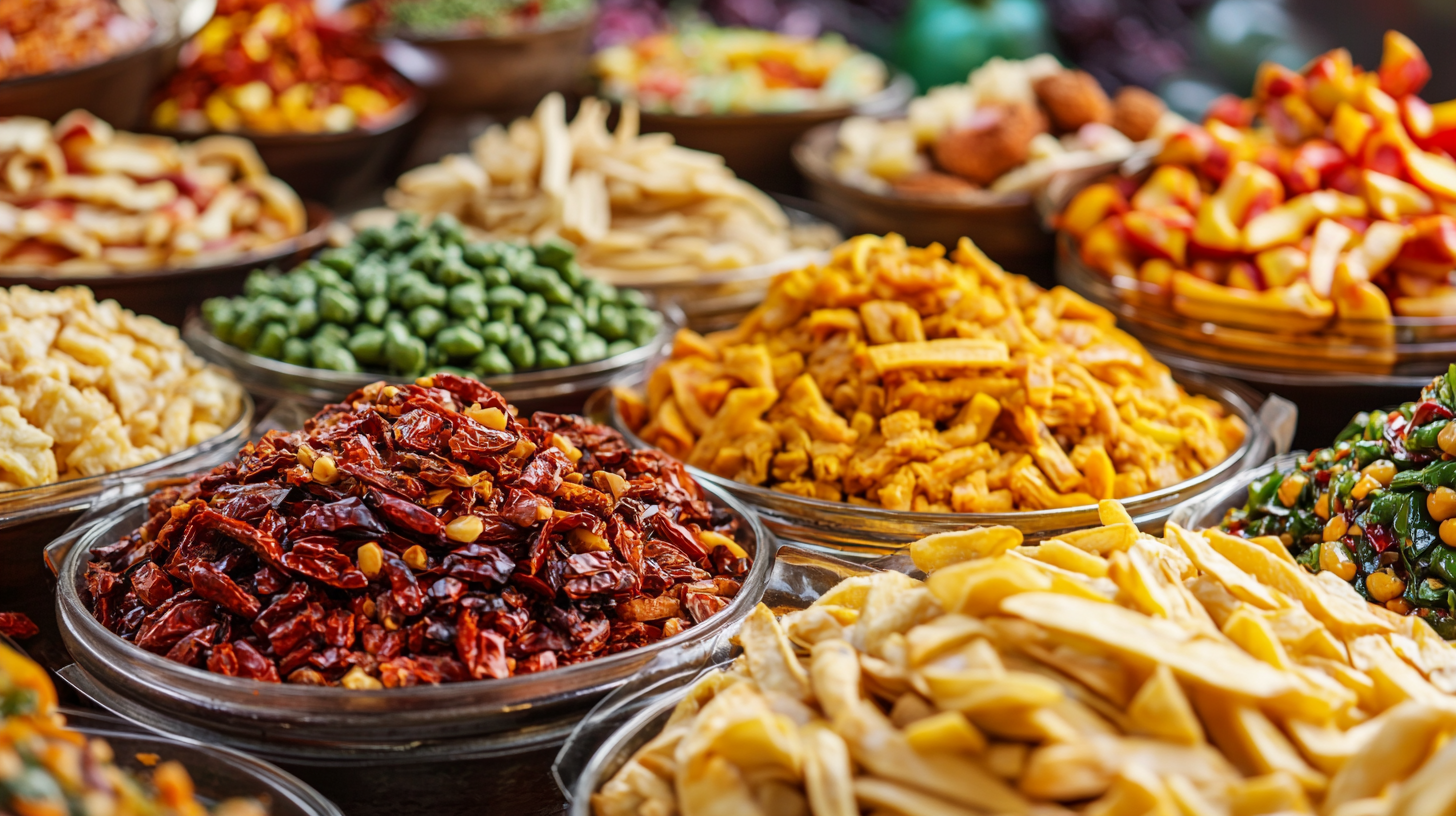Exceptional Quality from China Leading the Global Food Supplies Market
In recent years, China has emerged as a powerhouse in the global food supplies market, revolutionizing the way food products are sourced, produced, and distributed across the world. With its exceptional quality standards and rapid innovation in agricultural practices, China is setting new benchmarks that are reshaping the dynamics of food supply chains. The country’s commitment to leveraging advanced technologies and sustainable practices has not only enhanced the quality of its agricultural outputs but also ensured consistency and reliability for international consumers. As global demands increase and markets evolve, China’s leadership in food supplies is becoming more pronounced, prompting local farmers and producers to adopt best practices that align with international standards. This blog will explore how China's exceptional quality products are influencing the global food supplies landscape, paving the way for greater efficiency, safety, and sustainability in food sourcing worldwide.

The Rise of China's Food Supply Industry on the Global Stage
China's food supply industry is experiencing a remarkable ascent, positioning itself as a formidable player on the global stage. With its vast agricultural resources and innovative farming techniques, China is not only meeting domestic demands but also exporting quality food products worldwide. This surge is fueled by an increasing focus on food safety standards and sustainable practices, allowing Chinese producers to gain credibility among international consumers.
Moreover, the integration of advanced technology in agriculture has significantly enhanced productivity and efficiency. Smart farming, precision agriculture, and blockchain for traceability are just a few examples of how China is modernizing its food supply chain. As these advancements take root, the ability to provide exceptional quality food at competitive prices is strengthening China's foothold in the global market, leading to greater opportunities for trade and collaboration.
With its commitment to quality and innovation, China is set to reshape the global food supply landscape. This transformation not only benefits local farmers and businesses but also ensures a reliable supply of food products catering to the diverse tastes and preferences of global consumers.

Quality Assurance in Chinese Food Production: A Key Differentiator
Quality assurance is increasingly becoming a cornerstone of the food production industry in China, positioning the country as a leader in the global food supply market. Recent studies indicate that companies focusing on stringent quality control measures and sustainable practices are witnessing a competitive edge. According to data from industry reports, brands that emphasize high-quality ingredients and transparency in sourcing can differentiate themselves effectively in the marketplace. This is particularly relevant in the context of China, where rising consumer awareness regarding food safety and nutritional value is reshaping purchasing decisions.
Moreover, research on the agricultural brand competitiveness in China highlights the importance of brand management and market competitiveness. An evaluation index system based on factors like core brand competitiveness reveals that companies which prioritize quality assurance not only enhance customer trust but also significantly improve their market position. As the global market leans towards sustainability, understanding the influence of consumer awareness on food choices becomes crucial. Findings suggest that while competitive awareness can dampen consumers' green self-efficacy, fostering environmental awareness is essential for promoting sustainable food consumption. This paints a positive picture for Chinese brands that can align quality with eco-friendly practices to meet the evolving demands of global consumers.
Exceptional Quality from China Leading the Global Food Supplies Market
This bar chart demonstrates the quality assurance measures implemented in Chinese food production compared to other countries. The data illustrates the percentage of food products meeting international quality standards from 2018 to 2023.
Innovative Practices Boosting China's Competitive Edge in Food Supplies
China's food supplies market has seen remarkable growth, largely attributed to innovative practices that enhance its competitive edge. One significant avenue of innovation is the integration of technology in agricultural processes. Smart farming techniques, such as precision agriculture and the use of data analytics, allow farmers to optimize crop yields while minimizing resource use. This not only improves efficiency but also ensures the production of high-quality food products that meet global standards.
Another key element driving China's competitive advantage is its focus on sustainability. With an increasing demand for environmentally friendly practices, Chinese food suppliers are adopting eco-friendly methods throughout the supply chain. From organic farming to sustainable packaging solutions, these initiatives address both consumer concerns and regulatory requirements, making Chinese food supplies more appealing in the global market. By aligning their operations with sustainability goals, Chinese producers are not only enhancing their reputation but also increasing their ability to compete internationally.
Food Supplies Market Share by Country
Sustainable Sourcing: China's Commitment to a Greener Food Supply Chain
As the world's largest producer and exporter of agricultural products, China is increasingly committed to sustainable sourcing to ensure a greener food supply chain. According to the Food and Agriculture Organization (FAO), sustainable practices in agriculture not only help to mitigate the effects of climate change but also enhance food security. China is embracing initiatives like the "Green Agriculture Development Plan," which aims to reduce pesticide usage by 30% by 2030, showcasing its dedication to eco-friendly principles in food production.
Tip: When choosing suppliers, look for those who prioritize sustainability in their practices. This can include using organic farming methods, reducing carbon footprints, and ensuring ethical labor practices.
Additionally, data from the Chinese Ministry of Agriculture highlights that organic farming has grown over 20% annually, with the nation now leading the world in the area of certified organic land. This commitment to sustainable sourcing not only positions China at the forefront of the global food market but also sets a benchmark for other countries striving for similar goals.
Tip: Support brands that are transparent about their sourcing practices and certifications. This will encourage more companies to adopt sustainable methods, ultimately benefiting the environment and local communities.
Exceptional Quality from China Leading the Global Food Supplies Market - Sustainable Sourcing: China's Commitment to a Greener Food Supply Chain
| Category | Percentage of Market Share | Sourcing Method | Sustainability Rating |
|---|---|---|---|
| Fresh Produce | 30% | Organic Farming | A+ |
| Meat Products | 25% | Free-Range Breeding | A |
| Cereals and Grains | 20% | Sustainable Agriculture | B+ |
| Dairy Products | 15% | Grass-Fed | A |
| Seafood | 10% | Wild-Caught | B |
Global Partnerships: How China is Shaping International Food Trade
China has established itself as a pivotal player in the global food supplies market, with its vast production capabilities reshaping international food trade dynamics. According to the Food and Agriculture Organization (FAO), China accounted for nearly 30% of the world's total agricultural output in 2021. This remarkable statistic underscores China's critical role not only as a producer but also as a key partner in global food supply chains. The symbiotic relationships that China has fostered with countries across continents have facilitated the efficient exchange of goods, technology, and resources, thus enhancing food security in various regions.
Partnerships have been instrumental in this transformation. For instance, the China-Australia Free Trade Agreement has significantly boosted trade in agricultural products, with a 50% increase in exports from Australia to China since its inception. Furthermore, reports by Rabobank indicate that China's demand for meat is set to rise by 30% over the next decade, prompting nations such as Brazil and the U.S. to strengthen their export strategies to meet this growing need. Such collaborations not only diversify supply sources but also create economic opportunities for both exporting and importing countries, solidifying China's position as a cornerstone of the international food trade landscape.

